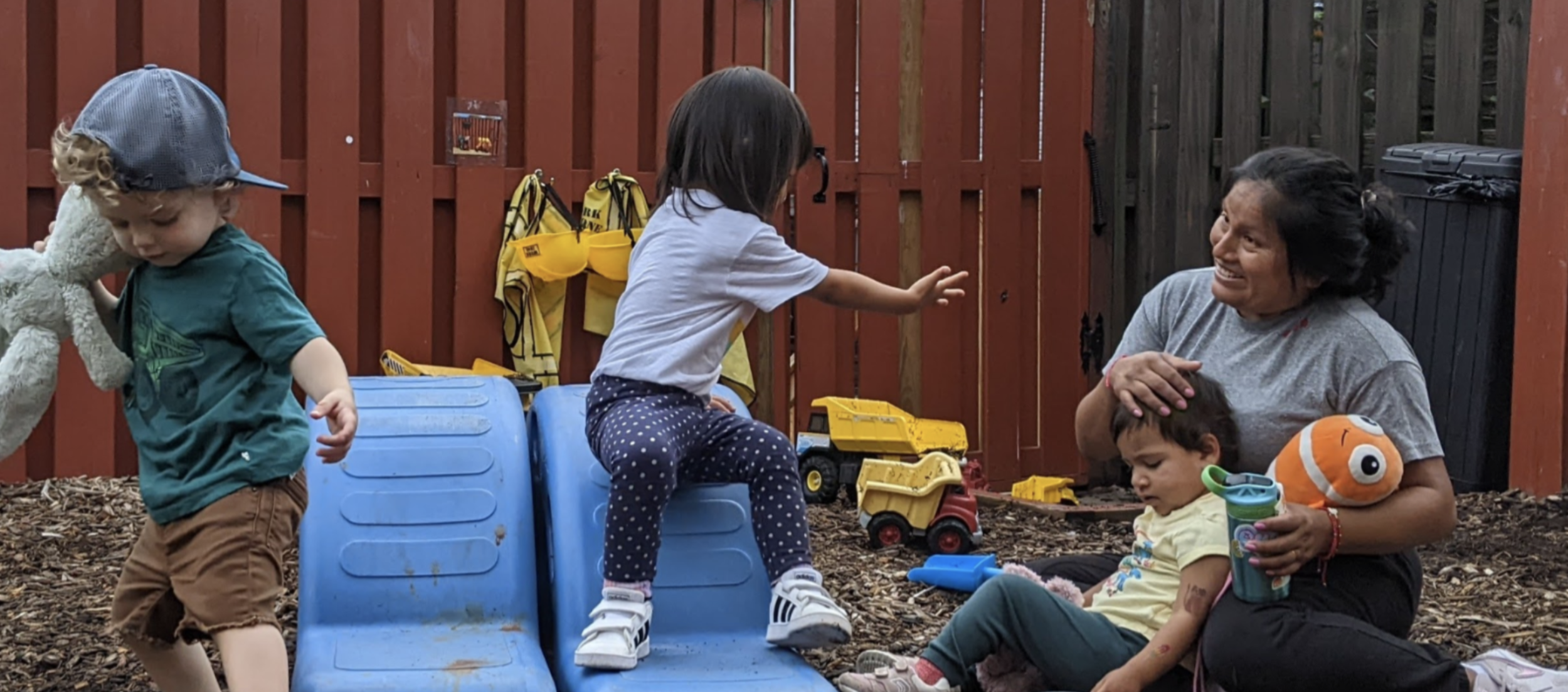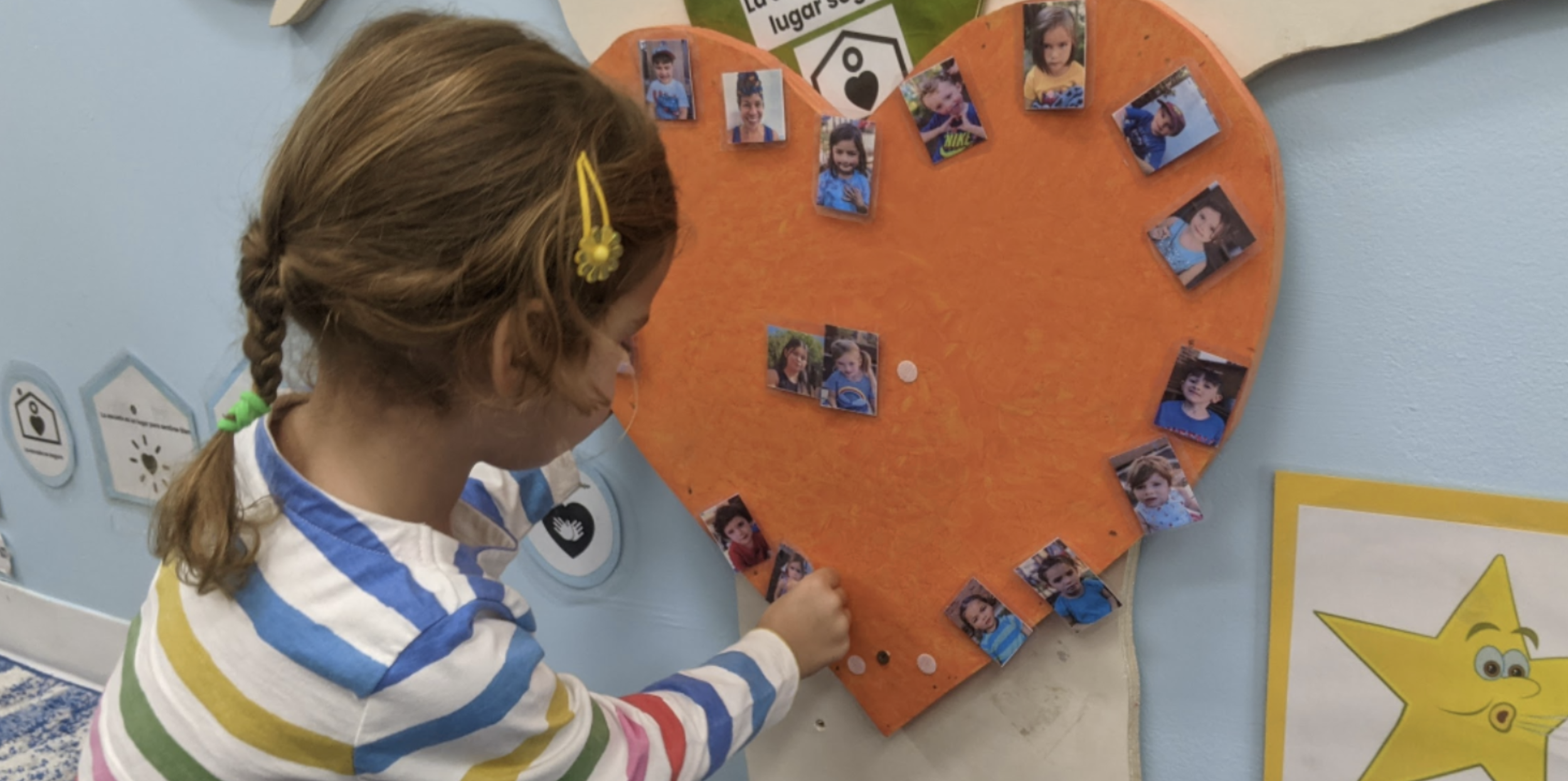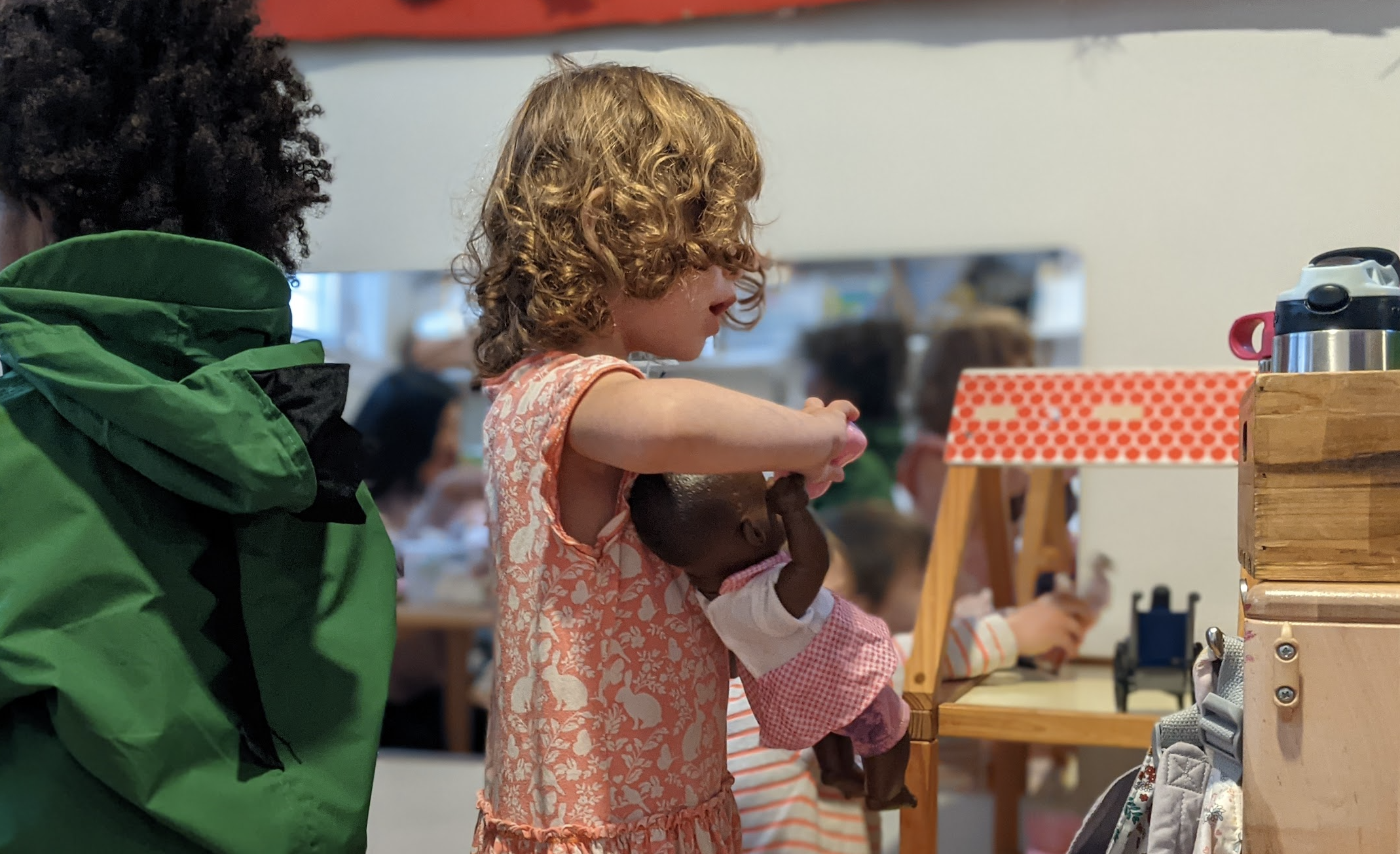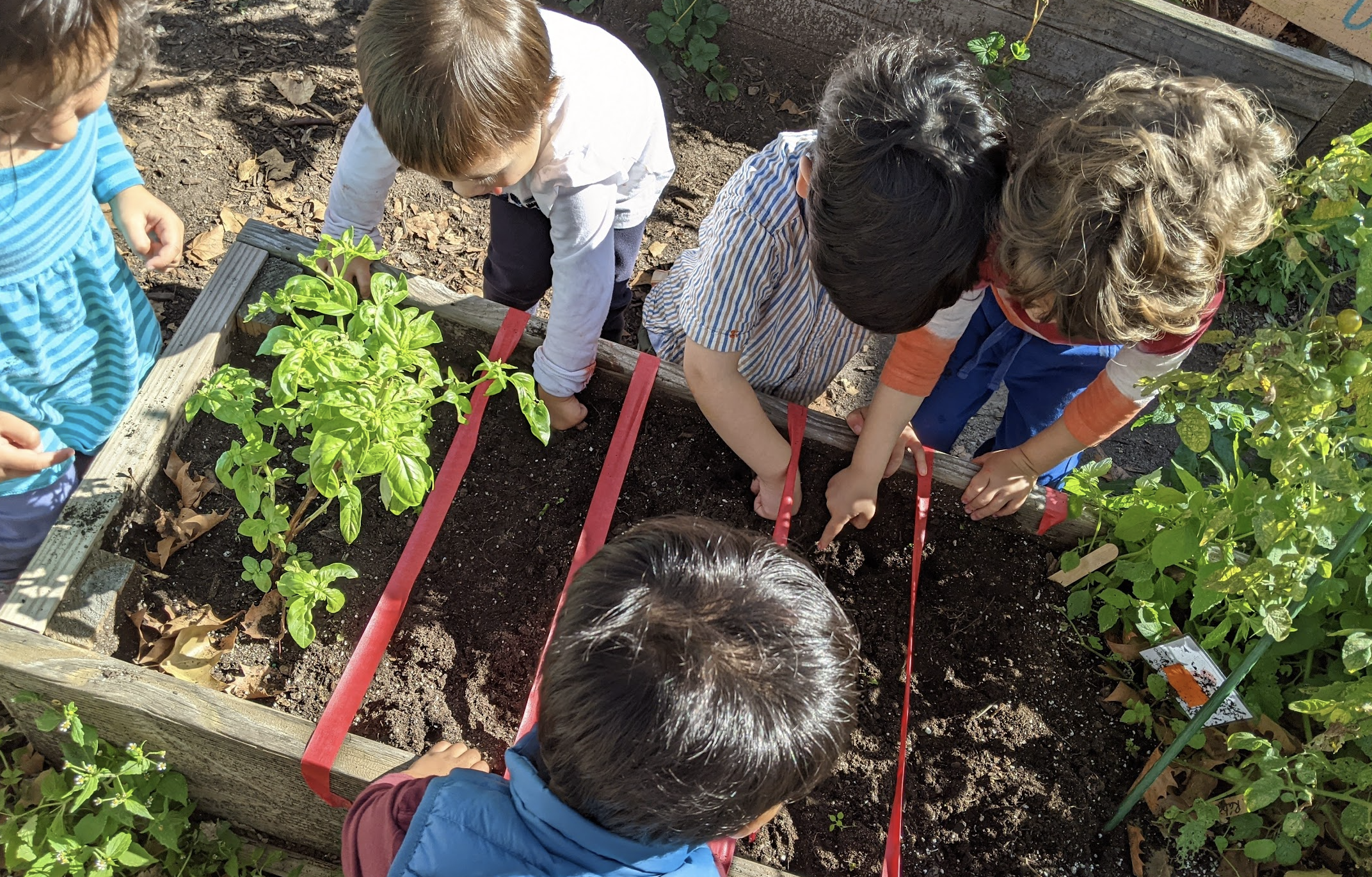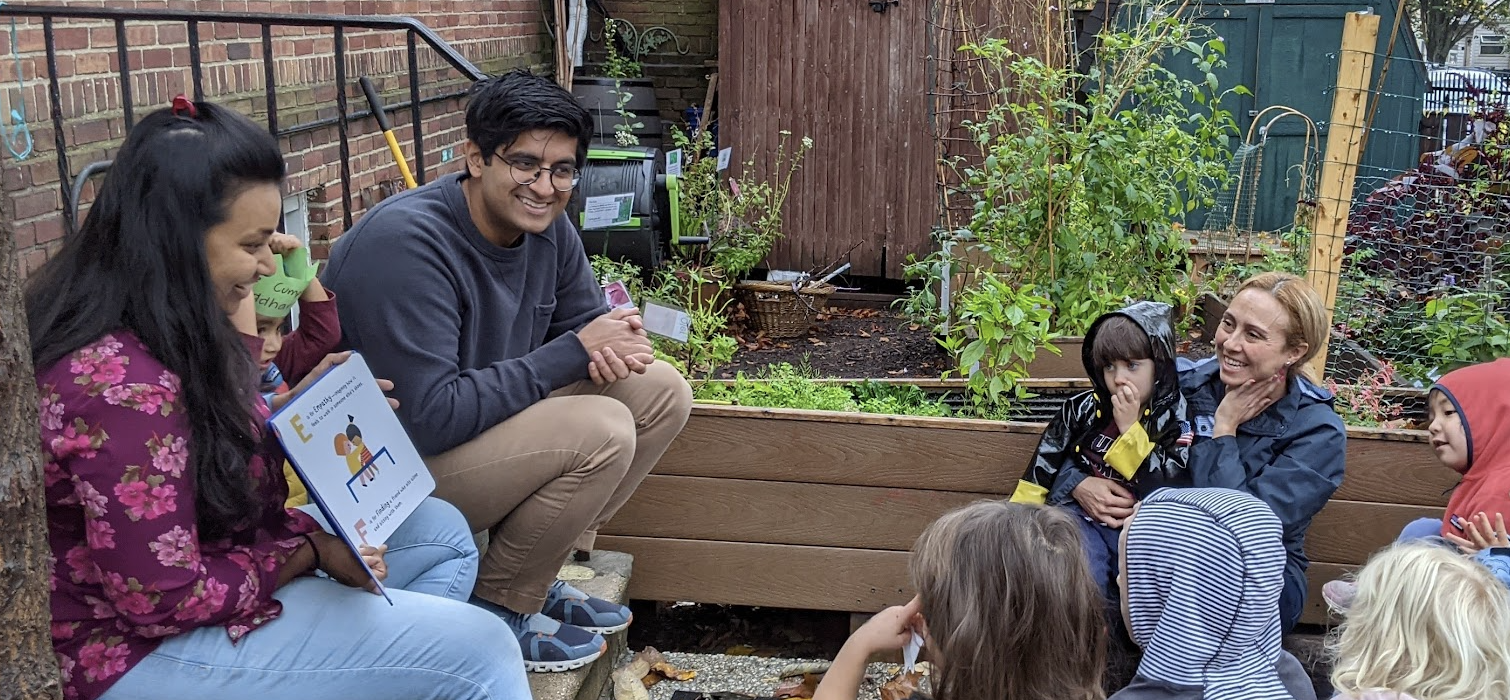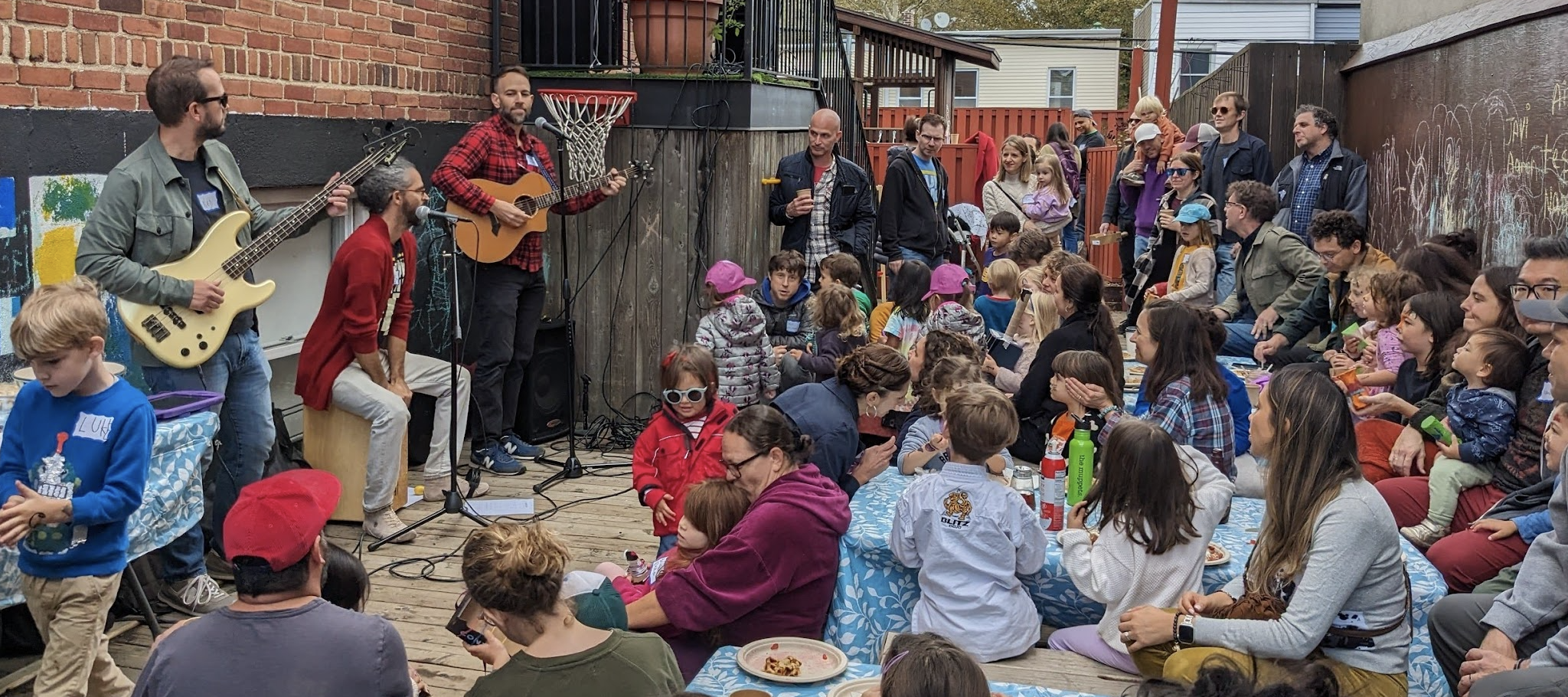Our Learning Approach
OUR APPROACH TO LEARNING
We believe education is transformative.
We carefully create a welcoming environment for all our families and children, and craft programs that value their diversity, needs, and interests.
We offer opportunities to connect with nature, foster social and emotional learning, and build Spanish language skills. We apply an anti-bias lens to all that we do, creating an inclusive environment that encourages curiosity and embraces diversity with joy and empathy.
We ask parents and guardians to be partners on our collective educational journey: by learning and growing together, we can support children to be their best selves.
What makes OWP special
Spanish-immersion
Social and Emotional Learning
Deep Understanding and Commitment to Anti-bias Education
Play-based, Emergent Curriculum that Aligns with Children’s Interests
Opportunities to Connect with Nature
Partnerships Between School and Home
Welcoming Community of Learners
Spanish-Immersion
One World Project offers Spanish-immersion educational experiences.
All of our teachers are fluent in Spanish. Our programs are designed to support both Spanish speakers and English speakers, regardless of what language(s) are spoken at home.
Spanish Language Learners
Children who have no prior experience in Spanish have the chance to begin learning Spanish in a predictable, nurturing, and supportive environment.
Spanish language development is supported by visual references, gestures, routines, and repetition. Teachers also paraphrase and use parallel talk in Spanish.
Language-rich activities are designed to draw on and connect with what children already know, and encourage informal conversations in play with teachers and peers.
Supporting Spanish Speakers
Those who already speak or understand Spanish when they start our program are provided opportunities to deepen and enhance their knowledge, with the chance to further their comprehension and conversational skills.
Bilingual or Multilingual Learning Environments
While all our teachers interact with children in Spanish, our learning environments are bilingual or sometimes multilingual. Children who are dominant in English will naturally talk to each other in English. Whenever we have a child who speaks or understands another language we seek ways to honor and highlight their additional language skills. We’ve been fortunate to welcome families who speak languages from all over the world into our community. We believe that learning languages allows us to break down barriers and to connect with one another.
For more Information
Every child responds differently to learning and practicing a new language. If you are looking for other resources or wondering what to expect, multilingualchild.org offers a description of what a child’s reaction may be if they are completely new to Spanish. For more information on the benefits of a language-immersion or bilingual education, please see this article.
Social and Emotional Learning
At OWP, our learning environments nurture. We recognize that being and feeling safe is a critical foundation for a child’s education. We believe that children’s social and emotional health and skills affect their overall development, and learning and that will be a foundation for the future and plant a seed beyond OWP.
OWP is a safe place to grow, feel well, and to learn. This idea is at the heart – el corazón – of all we do across One World Project: La escuela es un lugar seguro, para sentirse bien, para crecer y aprender.
OWP’s nurturing teachers use intentional and responsive strategies in order to support the transition to school from home, fostering respectful and trusting relationships and creating warm and welcoming learning environments in order to help children feel safe.
Children learn that all of their feelings – big, small, positive, and negative – are welcome without judgment. They build the tools to express themselves and to share their feelings with others, as well as to offer support and guidance to classmates and peers. We encourage students to express themselves honestly, navigate conflict with compassion, and instill in them the belief that their feelings and questions are valid without qualification. With these principles as a fundamental guide, we are ready to grow and learn together.
Traditions and Practices
Over the years, we have developed some important everyday community practices and routines that are now an integral part of the culture of OWP.
Some examples include:
Our Te Deseamos Lo Mejor song. We sing this song everyday thinking of members of our community that need some love, recognition, validation or … When someone is absent, we always use this song to send our best wishes filled with love.
Daily feelings check-ins
Our Silla Especial as a place of calm and self-regulation
We practice and teach the use of La Gran Voz, which is the assertive voice we use when we need to let others know how we want to be treated.
Modeling and practicing finding solutions together: Busca una solución juntxs
If you wish to receive more information or strategies for talking to your child about social-emotional learning and development, please do not hesitate to reach out so that we can share more with you. And if you are interested in finding out more about the scholars and educational theories that inspire us at OWP, you can do so here.
An Anti-bias Education
The social and emotional skills that help us manage feelings, create relationships with others, and work together in constructive ways are again deeply connected with OWP anti-bias goals. The more we learn to articulate and express ourselves, the more we can understand and perceive our unique identity, the ideas we have about others, and our capacity to recognize injustice and solve problems through collective action.
Using an anti-bias lens in all we do, we are committed to fostering a spirit of justice and equality both in and out of the classroom. More than a set of curricular activities, this approach is a commitment to equity and social justice. Anti-bias teachers observe carefully, think critically, and reflect deeply. We begin by affirming each child and family's unique backgrounds, and class materials reflect the identities of the children in the classroom community, creating a sense of self and belonging. Building on the strengths and knowledge that children bring to school with them, anti-bias teachers seek the active engagement of families and communities. Their families' knowledge and cultural practices enter and are incorporated into the classroom as an important part of the learning process. In these ways, OWP provides students with the tools to understand their own experiences, and to be thoughtful and inclusive of those around them as well.
We build our approach to anti-bias around four interrelated goals, drawing from the work of educational theorists Louis Derman-Sparks and Julie Olson Edwards.
Identity
Demonstrate self-awareness, confidence, family pride, and positive social identities.
Diversity
Express comfort and joy with human diversity; accurate language for human differences; and deep, caring human connections.
Justice
Recognize unfairness, have language to describe unfairness, and understand that unfairness hurts.
Action
Demonstrate empowerment and the skills to act, with others or alone, against prejudice and/or discrimination.
Teachers use open-ended questions that invite critical thinking about bias in our everyday interactions. We love engaging the whole class in dialogue and making collective decisions about our community norms. Specific practices like la gran voz (the big voice) offer a strategy that helps us communicate clearly and forcefully when we feel something is unfair, or somebody has been treated unkindly.
We approach with curiosity and challenge stereotypes, presenting evidence that helps us understand and celebrate differences wherever we see them. In order to expand our community, we invite diverse guests and families into our classrooms that children can learn from and about in meaningful ways. We actively look for and use books and materials that show diversity and challenge stereotypes in terms of race, gender, class, and more. We want children to see themselves in classroom materials, to use them as mirrors that can help them articulate and express their own identity. We also use these materials as windows, giving us a chance to expand our worldview and to empathize with new perspectives and experiences.
Play-based, Emergent Curriculum
Our emergent curriculum — led by children's interests, needs, and motivations — uses art, music, movement, and science to cultivate personal, global, and environmental awareness. Children are natural explorers and learn through play, and we make sure that each day includes opportunities for both free and structured play. Learning happens in our beautiful indoor classrooms, as well as our bountiful garden and various other outdoor learning spaces.
We believe that our curriculum should “emerge” from a particular child’s desire to learn about the world. We want to support our students in pursuing the answers that feel meaningful for them, and we provide them with the tools to answer whatever new questions each day might bring. At OWP, learning is an active process in which we all participate together, rather than a lesson to be taught and memorized. This outlook allows us to turn everything – from the discovery of a slug in the garden to the fire truck passing by outside – into an opportunity for growth and learning. The world is our classroom, and everything in it is a part of our curriculum.
We are dedicated to giving children agency in their own educational journeys, and we deeply value their interests and creativity. We know that children learn and grow best when they can feel excitement and ownership over their classroom experience. When students have the freedom to act upon their own interests in their own ways, they feel good about themselves. Rather than a fixed schedule that all students must follow, daily and weekly classroom curricula are always guided by ideas, questions, and concepts that children are passionate about. Our teachers observe actively, prepare deeply, and react supportively. They work hard to design and develop classroom plans that incorporate not only the varied interests of the class, but also the individual personalities of each student.
Connections with Nature
At OWP, we feel strongly that a relationship with nature is essential to a child’s development. Through gardening, composting, and playing freely in our various outdoor spaces, children develop a sense of wonder and awe about the natural world. Together, we learn that the more we care for the natural world and allow it to flourish, the more we can appreciate and learn from the plants and animals we see, no matter how big or small.
We are grateful for all of the beautiful plants and animals around us every day, and students learn first-hand about the ways that our ecosystems rely on each species, from the smallest to the biggest. We ask big questions, wonder constantly about the world around us, and we investigate first-hand everything from the color of the sky and the changing seasons, to the critters beneath our feet.
Students have the opportunity to get their hands dirty in the garden, watch vegetables grow from seeds they have planted, and explore the huge diversity of native wildlife that comes to visit as a result. They get the chance to engage in open-ended play, taking risks and setting boundaries in our playground and climbing structure. They make connections with each other, work collaboratively to solve problems and invent new games, and experience the thrill of discovering the depth and breadth of all that nature has to offer. In helping children to become stewards of the environment, they learn to honor and nurture themselves, their peers, and the world around them.
Partnerships Between School and Home
We ask parents and caregivers to be true partners with us on this educational journey. We are grateful that you can join us in sharing ideas and asking questions. This allows us all to better understand the needs of the children and of our community, and better support each other as we continue to grow together.
We make concerted efforts to create classroom communities that facilitate connection and growth both in school and at home. These classroom communities are not just children and teachers, but also parents and caregivers as well. We believe that everyone provides what they can, and that each of us brings something unique and important.
Parents, caregivers, and extended family are cordially invited to join our classes for our Welcome Celebrations, as well as for sharing talents, meaningful family traditions, and life events such as birthdays, cultural celebrations, and even the birth of new family members. The presence of family in the classroom allows children to continue feeling safe and well at school, easing the transition and providing continuity between the classroom and the home.
We ensure regular communication with families throughout the year both formally and informally, and invite families to participate in a range of activities. This can include, but is not limited to, weekly class recap emails, announcements in Google Classroom, Parent-Teacher Conferences, and a wide-ranging variety of community events.
In addition, we are always happy to offer support and advice for ways that families can support growth in all areas of childhood development, and we frequently host workshops and conversations so that families and teachers can come together and learn from one another. In this way, we can continue to create a curious and caring network of support between you, our teachers and staff, and our students.
Intentionally Creating Community
We offer many opportunities to build community and make connections with others at OWP. We strive to create an environment in which families and friends can seek each other out for support, for connection, and for growth. Families Together, our buddy families program, pairs an incoming family with a returning OWP family in order to support their transition to school, to help the new families feel welcomed and included, and to provide another space in which to exchange questions and ideas. We also provide plenty of chances for families, neighbors, and friends to volunteer and participate in community events. From bake sales to holiday markets to pajama pizza parties, we always look forward to connecting with families and connecting families with each other.
Our community-centered approach means that we deeply value and care about your ideas, questions, and opinions as well. We know that together we can be far more than the sum of our parts, and we cherish every opportunity to work with you — our family, friends, and neighbors — in making OWP a more welcoming space. In these ways, we are able to build and maintain lasting relationships, and remain immensely grateful for the chance to stay in touch with old friends long after they have left OWP. You are always welcome!
